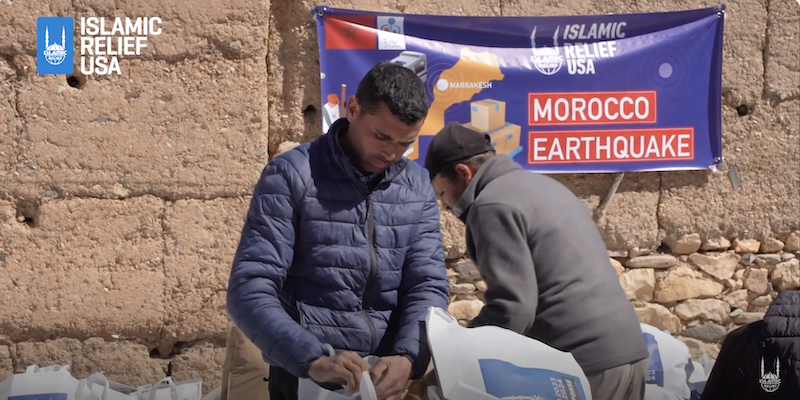Disaster relief is a key part of the humanitarian aid provided by the nonprofit Islamic Relief USA (IRUSA) and its partners in the global Islamic Relief federation. Here is a closer look at some of the many disasters, emergencies, and humanitarian crises—both natural and manmade—that IRUSA and its partners have responded to.
Rain and flash floods in East Africa
Since mid-2023, the El Nino weather phenomenon has caused extreme weather events across East Africa, with torrential rain and flash floods taking lives and destroying homes. Reports suggest that around 1 million people have been displaced across the region as a result, and that around 350 people have died.
In Beledweyne, Somalia, recent flooding left 85% of the city underwater. In the aftermath of the disaster, aid agencies reported that damage to vital infrastructure had resulted in a widespread lack of access to safe drinking water and sanitation, triggering a surge in waterborne diseases like acute diarrhea and cholera.
Since 2023, Islamic Relief has maintained an active presence across Kenya, Ethiopia, and Somalia. Recognizing the continued need from vulnerable families across East Africa, IRUSA has relaunched its emergency appeal. Donations from generous supporters have helped Islamic Relief to provide immediate aid, as well as enabling the organization to expand its programming, providing long-term solutions in drought and flood-prone areas.
Earthquakes in Afghanistan
In addition to political upheaval, Afghanistan has been affected by major droughts and other natural disasters in recent years. Since October 7, 2023, the Herat region has been devastated by four earthquakes, each of which had a magnitude between 4.7 and 6.3. More than 2,000 Afghans were killed in the earthquakes with thousands more injured. Across Herat, more than 3,000 homes have been destroyed, leaving families homeless. According to aid agencies, more than 40,000 people have been affected by the earthquakes.
Islamic Relief works with local partners across Afghanistan to promote long-term recovery and deliver emergency relief. The organization has provided cash assistance to enable local people to meet basic needs such as purchasing food, as well as providing hygiene kits and transitional shelter and rental assistance for displaced families.
Children orphaned by war and conflict
Around the world today, there are more than 153 million orphans, with almost 6,000 more children being orphaned each day. Islamic Relief is committed to protecting orphaned children from illness, providing safe drinking water and proper nutrition, and helping all children to access educational opportunities to break the cycle of poverty.
One in five orphaned children globally lives in a conflict or war zone, with studies suggesting that these children are at a disproportionate risk of experiencing hunger, loss of education, violence, psychological stress, and a lack of access to basic resources.
Operating across Central Asia, the Middle East, Africa, Asia, and Europe, IRUSA’s orphan sponsorship scheme enables generous donors to sponsor more than 30,000 orphans, transforming young people’s lives by providing food, shelter, education, healthcare and other essentials. In total, Islamic Relief is helping over 85,000 orphans worldwide to look forward to a better future through its programs.
The humanitarian emergency in Palestine
In Palestine, fighting has escalated in recent months, resulting in the deaths of over 32,000 civilians, with thousands more reported injured or missing. In Gaza, where a total blockade is currently in place, some 2 million people lack access to food, electricity, and fuel. With more than 60% of all residential property damaged or destroyed, the region faces an impending famine, according to the United Nations. Around 90% of Gaza’s population has fled their homes due to fighting. As a result, hundreds of thousands of people are sleeping outside without appropriate clothing to shield them from the cold.
Gaza’s health system has also come under attack, the region grappling with a dire shortage of essential medical supplies and medical staff, meaning that only 12 out of Gaza’s 36 hospitals are even partially functional. Unless Gaza’s health systems are restored to meet the local population’s most basic healthcare needs, many more people will die of disease, the United Nations warns.
Islamic Relief USA and partner organizations are striving to deliver life-saving aid across Palestine today despite the blockades. The organization has provided immediate trauma responses for 4,000 to 5,000 people, as well as delivering health care services to more than 23,000 people living in shelters via mobile health clinics.
IRUSA partners have also provided winter aid packages, including non-food items such as winter clothing and blankets. They have additionally delivered live-saving medical supplies to Al-Awda Hospital, Al-Ahli Arab Hospital, and Hayfa Hospital, as well as distributing hygiene kits to people in shelters, and providing food parcels to displaced families. IRUSA partners are also procuring and stockpiling food, non-food items, medical supplies, and water to be delivered once a pathway for humanitarian aid has been restored.
Women and girls in need
Recognizing that in vulnerable communities, living situations are disproportionately worse for women, IRUSA and its partners support numerous women’s programs worldwide that provide a livelihood for widows and equip them with the tools and knowledge they need to support their families. These programs help to empower women and girls, providing access to equal opportunities and resources. Interventions implemented by Islamic Relief include small business opportunities and socio-economic empowerment in Somalia; helping to empower women entrepreneurs across Afghanistan; and sustainable livelihood support for widowed, orphaned, and female-headed households in Pakistan and Nepal.
